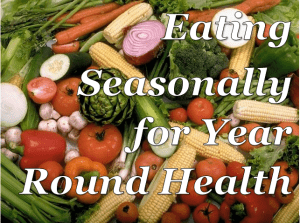The trees have begun to wake from their winter slumber, the ground is thawing, and it is nearly time to plant gardens and fields. For much of our history the human diet was restricted by the seasonal availability of grains, fruits, and vegetables. Not until economic globalization in the 19th and 20th centuries did we gain regular access to avocados from Mexico in December, or tomatoes from El Salvador in March. This change in market availability, and the rise of the super-sized grocery store has altered our grocery shopping and eating patterns, often to our detriment.
Eating seasonally, as our ancestors did, means consuming what is ripe locally, when fruits and vegetables are at their peak of both flavor and nutrient content. What exactly this means varies by geographic location and latitude. In New England, our distinct seasons mean that we get a full rotation of crops throughout the year: squashes, hardy greens, and root vegetables in the fall and winter, then crisp greens, berries, fruits, and vegetables in the spring and summer. Fish and seafood also follow a seasonal rotation, which is based largely on ocean temperature.
Eating seasonally benefits your body in many ways. Eating what’s ripe often corresponds to eating what’s local. When food is grown closer to the intended consumer it can be picked at its peak of flavor and nutrient content, not a week early and then left to ripen off the vine while it is transported across the country or ocean. Focusing on eating seasonally can also inspire you to eat a wider variety of produce, leading to more complete nutrient coverage in your diet. Kohlrabi, beets, and bok choy may not make frequent appearances on your dinner table, but all three are abundant in-season, and are important sources of vitamins, minerals, and phytonutrients; remember to strive to eat a variety of colors! In season produce can also correspond to your body’s needs, which change throughout the year. Many winter squashes, like butternut and acorn, contain serotonin boosting nutrients, which help to battle the winter blues. The antioxidants in spring fruits and vegetables have anti-inflammatory properties, which can reduce the severity of allergy symptoms. Summer produce, with its high vitamin C and E content, along with the omega-3s from in-season avocados, will protect skin from sun damage, and watermelon keeps you well hydrated. Fall garlic has anti-viral properties to help ward off the common cold and flu, as will the antioxidant quercetin, found in onions, grapes, and apple skins1.
Eating seasonally can be just as easy, and more fun, than your everyday shopping experience. The simplest way to eat seasonally is often just to pay attention to what is on sale in your supermarket’s produce section. Peaches that cost $4 a pound in February drop to $0.99 a pound in August, their peak season. When produce is ripe locally, the cost to transport it drops and supermarket prices decrease accordingly, so keep your eyes open! Farmers markets are also excellent places to pick up in-season produce, and sometimes even seafood. Planting your own vegetable garden can be good for both mind and body. Or, if a garden is too much of a commitment, pick-your-own farms are great places to spend a day collecting berries, corn, stone fruits, apples, and many others. Another option is to sign up for a CSA box, sometimes also called a farm share. With a CSA you pay the farm before the growing season to help them buy supplies and seeds, and in return they provide you with a mixed box of whatever is ripe throughout the summer and fall. This is a great way to incorporate a larger variety of produce into your diet. Some farm shares with pick-ups in Boston and the Boston metro area are:
Enterprise Farm (home delivery option for extra fee)
As with all things, eating seasonally is best done in moderation; sometimes a Caprese salad in January is exactly what the doctor ordered. However, it is also a fantastic way to make sure that you are eating the healthiest, most delicious and nutritious food possible. Bon appetit!
To your health!
Best,
The Enhanced Medical Care Team







Leave A Comment